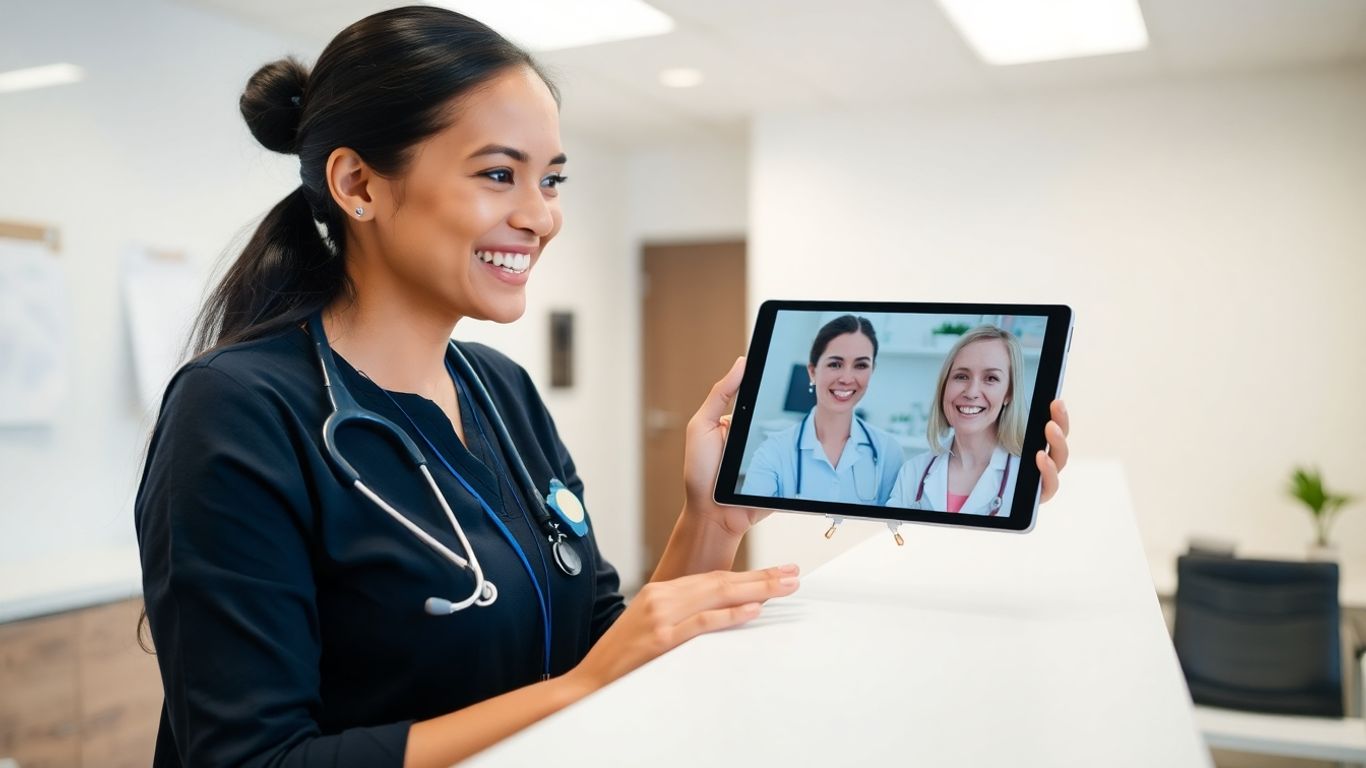Running a medical office is a balancing act. You've got patient care to focus on, but then there's all the admin work, right? It can feel like too much sometimes. That's where a virtual receptionist for medical practice comes in. Think of it as an extra pair of hands, but working remotely, to help keep things running smoothly so you and your staff can concentrate on what matters most: your patients.
Think about how many times a patient tries to call your office only to get a busy signal or wait on hold forever. It’s not a great first impression, right? That’s where a virtual receptionist really shines. They’re like your practice’s front door, but available all the time and never overwhelmed. Making it easier for patients to connect with you is the name of the game.
Getting an appointment booked shouldn't feel like a puzzle. A virtual receptionist can handle all of that. They can:
This takes a huge load off your in-house staff, letting them focus on patients who are actually in the office. It means fewer missed appointments and a smoother flow for everyone.
Patients want to feel heard. A virtual receptionist ensures they are. They can answer common questions, provide directions, explain basic pre-appointment instructions, and even follow up after a visit to check in. This consistent communication builds trust and makes patients feel valued. It’s about keeping that line of communication open, even when your office is closed.
Your patients don't just get sick during business hours, do they? A virtual receptionist can be available 24/7. This means patients can call anytime to leave a message, schedule an appointment, or get answers to basic questions.
This constant availability is a huge plus for patient satisfaction. It shows you're a practice that cares about their needs, no matter the time of day. It’s like having an always-on information desk for your practice.
This kind of accessibility can really set your practice apart from others that might have more limited hours.
So, what exactly does a virtual receptionist do for your medical practice? It's more than just answering phones. Think of them as your remote administrative backbone, handling a bunch of tasks that keep your practice running smoothly. They're the first point of contact for many patients, and getting this right makes a big difference.
This is probably the most obvious function. When a patient calls, your virtual receptionist is there to pick up. They're trained to handle a variety of questions, from simple appointment bookings to more detailed inquiries about services or directions. They can screen calls, take messages, and direct urgent matters to the right person in your practice immediately. It’s about making sure no patient feels ignored, even when your in-house staff are busy with other patients.
Keeping patient records up-to-date is super important, and it takes a lot of time. Virtual receptionists can help with this. They can input new patient information, update existing records with new contact details or insurance changes, and even help with basic data entry tasks related to billing or insurance claims. This frees up your medical staff to focus on what they do best: patient care.
Accurate record-keeping is the bedrock of efficient healthcare. When administrative tasks are handled by dedicated professionals, the risk of errors decreases, and patient data remains organized and accessible.
Beyond just scheduling appointments, virtual receptionists can play a role in coordinating care. This might involve following up with patients after appointments to check on their well-being, sending out reminders for follow-up visits, or even assisting with the referral process. They can help ensure that patients get the necessary information and support to navigate their healthcare journey, making the whole experience less stressful for them and for your practice.
Artificial intelligence is really changing how medical offices handle things. It's not just about fancy robots anymore; AI can actually help with a lot of the day-to-day stuff that keeps a practice running smoothly. Think about it – instead of a person having to answer every single question or book every appointment, AI can step in and do a lot of that work, often faster and more consistently.
AI can be trained to understand and answer a wide range of patient questions. This goes beyond simple FAQs. It can access a knowledge base you provide about your practice, services, and even general health information, responding in a way that sounds natural. This means patients get accurate information quickly, without having to wait for a staff member to become available. It's like having a super-informed assistant ready around the clock.
AI can process vast amounts of information and present it in an understandable way, making it a powerful tool for patient education and support. This capability helps bridge information gaps and can lead to better patient understanding and adherence to care plans.
Scheduling appointments can be a real time sink. AI can take over this process entirely. Patients can interact with the AI, either through a phone call or even a text message, to find available slots and book their appointments. The AI can check your practice's schedule in real-time and confirm bookings instantly. This is a huge help, especially for practices that get a lot of appointment requests or have busy phone lines.
Here's how it typically works:
This automation means fewer missed appointments due to scheduling errors and a more convenient process for patients.
One of the biggest advantages of AI receptionists is their availability. They don't sleep, take breaks, or go on vacation. This means your practice can offer support and handle basic inquiries 24 hours a day, 7 days a week. For patients, this constant availability is a game-changer. They can get help when they need it, whether it's late at night or on a weekend. This kind of round-the-clock service builds patient trust and loyalty, showing them that your practice is always there for them.

Getting a virtual receptionist to work with your practice shouldn't feel like trying to fit a square peg into a round hole. It's all about making sure the new system plays nice with the tools you're already using. Think about your current appointment scheduling software. A good virtual receptionist service will connect with these systems easily. This means when a patient books an appointment, it shows up right away in your main schedule, no manual double-entry needed. It’s like having a digital assistant who knows exactly where to put the information. This connection helps avoid double bookings and makes sure everyone is on the same page.
Beyond just scheduling, your virtual receptionist can also sync up with your Customer Relationship Management (CRM) or practice management software. This is where patient history, contact details, and other important info live. When your virtual receptionist handles a call or inquiry, they can update these records automatically. This keeps your patient data current and complete. It means your in-house staff can access the latest information without having to hunt for it. This kind of integration really helps keep the patient journey smooth from the first call to follow-up appointments. It's about making sure all the pieces of your practice management puzzle fit together.
For those who like to get really efficient, services that connect with tools like Zapier are a big deal. Zapier acts like a bridge between different apps and services. So, if your virtual receptionist takes a message, Zapier can automatically send that message to your team via email or Slack. Or, if a new patient calls, Zapier can create a new contact in your CRM. This automation cuts down on manual tasks significantly. It means fewer chances for human error and more time for your staff to focus on patient care. It’s about building a system where tasks happen automatically in the background, making your practice run like a well-oiled machine. You can set up custom actions based on call outcomes, which is pretty neat. For example, if a call is marked as urgent, Zapier can create a high-priority task for your team. This level of automation is a real game-changer for practice efficiency. Learn more about Zapier.
Integrating a virtual receptionist isn't just about adding a new service; it's about making your existing systems work better together. When everything is connected, information flows freely, tasks get automated, and your practice operates with less friction. This makes life easier for your staff and provides a better experience for your patients.
Let's talk about the money side of things, because, let's be honest, every practice owner is thinking about it. Bringing on a full-time, in-house receptionist means more than just a salary. You've got benefits, training, office space, equipment, and all those little extras that add up fast. It's a significant investment, no doubt about it.
A virtual receptionist service flips that script. You're not paying for a physical desk, a computer, or benefits. You're paying for the service itself, which is often structured in a way that's much more budget-friendly. Think about it: you get professional call handling and administrative support without the big overhead associated with hiring an employee. This can be a real game-changer, especially for smaller practices or those just starting out. It's like getting a dedicated front desk without the need for extra square footage or a whole HR department to manage them.
One of the best parts about virtual receptionists is how flexible they are. Many services offer different plans, so you can pick what works best for your practice's workload and budget. Maybe you only need help during peak hours, or perhaps you need 24/7 coverage. You can often scale up or down as needed, which means you're not paying for idle time. This pay-as-you-go or tiered model makes it easier to manage your expenses and avoid unexpected costs. It's a smart way to get the support you need without breaking the bank.
With a virtual receptionist, you usually know exactly what you're going to pay each month. Most services have clear pricing structures, often based on call volume or a set number of minutes. Some even offer features like setting maximum monthly minutes, which gives you direct control over your spending. This predictability is a huge plus for budgeting. You can avoid those surprise bills that sometimes pop up with traditional employment models. It's about getting consistent, reliable support while keeping a firm grip on your practice's finances.
The shift to virtual receptionists isn't just about saving money; it's about reallocating resources. By reducing administrative overhead, practices can invest more in patient care, technology, or staff development, ultimately leading to a stronger, more efficient operation.

When you bring a virtual receptionist into your medical practice, the biggest question on everyone's mind is probably about patient privacy. It's totally understandable. We're dealing with sensitive health information, and the rules around it, like HIPAA, are super important. You need to know that your virtual receptionist service takes this as seriously as you do.
Not all virtual receptionists are created equal, especially when it comes to healthcare. The ones you want are the ones who have gone through specific training on HIPAA regulations. This isn't just a quick overview; it means they understand:
This training is key. It means the person answering your calls isn't just a friendly voice; they're a trained professional who knows the rules of the road when it comes to patient data.
Beyond just training, the actual systems and processes used by the virtual receptionist service matter a lot. Think about:
It's not enough for a service to say they're HIPAA compliant. You need to see the proof in their actions and their agreements. Ask for details about their security measures and request a BAA. This document is your assurance that they understand their responsibilities in safeguarding patient data.
Ultimately, the goal is to maintain the same high standards of patient privacy that you uphold within your physical practice. This means:
When you partner with a virtual receptionist service that prioritizes HIPAA compliance, you're not just outsourcing administrative tasks; you're adding a layer of secure, professional support that respects your patients' privacy and helps your practice run smoothly and safely.

Let's be real, running a medical practice means juggling a million things. Your in-house staff are amazing, but they often get pulled away from patient care to handle administrative tasks. That's where a virtual receptionist really shines. They can take a huge chunk of that workload off your team's shoulders, making everything run a lot smoother.
Think about your nurses and medical assistants. They're trained to care for patients, not to spend half their day on the phone scheduling appointments or answering basic questions. A virtual receptionist handles these tasks, allowing your skilled staff to focus on what they do best: providing direct patient care. This means less time spent on administrative duties and more time spent with patients, which can lead to better health outcomes and happier patients.
Daily operations can get bogged down with things like appointment booking, rescheduling, sending reminders, and managing patient inquiries. A virtual receptionist can manage all of this efficiently. They can:
This automation means fewer dropped balls and a more organized workflow for your practice.
No-shows are a real drain on practice efficiency and revenue. A virtual receptionist can significantly cut down on these by implementing a robust reminder system. They can send out automated appointment confirmations and follow-up reminders, often through multiple channels like text messages and emails. This proactive approach helps patients remember their appointments, leading to fewer missed slots and a more predictable schedule for your practice. It's a simple change that makes a big difference.
The ability to automate routine administrative tasks is a game-changer for medical practices. By delegating these responsibilities to a virtual receptionist, you not only reduce the burden on your in-house team but also create a more streamlined and efficient operational flow. This allows your practice to operate at a higher capacity, serving more patients effectively without sacrificing quality of care.
Think about the last time you called a doctor's office and got put on hold forever, or worse, got a voicemail that you weren't sure would ever get a response. It's not a great feeling, right? Patients today expect quick, clear communication, and that's exactly what a virtual receptionist can help provide. They're trained to handle calls professionally, answer common questions, and make sure patients feel heard right from the first contact. This means fewer frustrated patients and a smoother start to their healthcare journey.
When patients consistently have positive interactions with your practice, they start to trust you. A virtual receptionist contributes to this by offering reliable service, remembering details, and communicating clearly. It's like having a friendly, knowledgeable face greeting them every time, even if that face is on the other end of a phone line. This consistent, good service builds a sense of loyalty, making patients more likely to return and recommend your practice to others. It shows you care about their experience, not just their medical needs.
From the moment a patient first calls to book an appointment, to follow-up questions after a visit, every step matters. A virtual receptionist helps tie these steps together. They can manage appointment scheduling, send out reminders to cut down on missed appointments, and even help coordinate referrals. This makes the whole process feel less like a series of disconnected tasks and more like a continuous, well-managed experience for the patient. It means less confusion and a more organized path to getting the care they need.

Ever feel like you're drowning in voicemails? It's a common problem, especially when your staff is busy with patients. A virtual receptionist can really help here. They use AI to take those voicemails and turn them into text. This means you can just read the message instead of listening to it, which is way faster. You can then quickly see if it's urgent or not. It's like having a super-efficient assistant who sorts through all your messages for you, making sure nothing important gets missed.
What happens when your phone rings off the hook? If you have an in-house receptionist, they can only handle so many calls at once. This can lead to busy signals and frustrated patients. Virtual receptionists, especially those with unlimited parallel call capabilities, don't have this problem. They can manage a huge number of calls simultaneously. This is a big deal for practices that get a lot of patient inquiries or during busy seasons. It means every patient gets a chance to connect, no matter how busy things get.
Not all calls are the same, right? Some need to go straight to a specific department, while others can wait. Virtual receptionists can be set up with custom call flows. You can decide exactly how calls are routed. For example, a call about billing might go to the billing department, while a new patient inquiry goes to scheduling. If all lines are busy, or if it's after hours, you can set up overflow options. This could be sending the call to another available agent, taking a detailed message, or even routing it to a voicemail that gets transcribed. It makes sure every call is handled the way you want it to be.
Setting up these advanced features might sound complicated, but it's really about making your practice run smoother. It's about making sure patients get the help they need, when they need it, without your staff getting bogged down in administrative tasks. Think of it as fine-tuning your practice's communication system so it works perfectly for everyone involved.
So, you've decided a virtual receptionist could be a good fit for your medical practice. That's a smart move, but picking the right service can feel a bit overwhelming. It's not just about finding someone to answer the phone; it's about finding a partner who understands the unique needs of a healthcare setting.
Before you even start looking, sit down and really think about what your clinic needs most. Are you drowning in appointment requests? Do you struggle with after-hours calls? Maybe your current staff is swamped with administrative tasks. Make a list. Consider things like:
Understanding these points will help you narrow down your options significantly. You don't want to pay for services you won't use, and you definitely don't want to miss out on features that could really help your practice.
It's important to match the service to your specific workflow. A small solo practice might have very different needs than a large multi-physician clinic.
Once you know what you're looking for, it's time to check out the companies offering virtual receptionist services. Don't just go with the first one you find. Look for providers who specifically mention experience with medical practices or healthcare in general. This is important because they'll be more familiar with the terminology and the sensitive nature of patient interactions.
Ask about their training process for their receptionists. Are they trained in HIPAA compliance? Do they understand medical terminology? A good provider will be transparent about this. Some services use AI, while others use human receptionists. Consider which approach best suits your practice's culture and patient expectations.
Finally, think about how the virtual receptionist will fit into your daily workflow. A good service will make this transition smooth. They should offer easy setup and clear communication channels. Ask about their reporting and analytics – knowing how many calls were handled, how many appointments were booked, and patient feedback can be really insightful.
The goal is to have the virtual receptionist feel like an extension of your own team, not an outsourced add-on. If they can integrate with your current systems, that's even better. It means less manual data entry for your staff and a more cohesive patient experience. Remember, the right virtual receptionist service should free up your team, not create more work.
Picking the best virtual receptionist for your practice can feel tricky. You want someone who's always there, understands your needs, and makes things easy. Our service is designed to do just that, helping you focus on what matters most – your patients. Ready to see how simple it can be? Visit our website to learn more and get started today!
So, we've talked a lot about how virtual receptionists can really change things for a medical practice. It's not just about answering phones anymore. These services can handle appointments, answer patient questions, and keep things running smoothly even when your office is closed. This means your staff can spend more time actually taking care of patients, which is what everyone wants. Plus, it can actually save you money compared to hiring more people in-house. It really seems like a smart move for practices looking to get more organized and give their patients a better experience. If you're feeling overwhelmed with the day-to-day stuff, looking into a virtual receptionist might be the next best step for your practice.
Think of a virtual receptionist as a helper who works remotely, like from their own home. They use phones and computers to do the same jobs a receptionist in your office would do. This includes answering calls, scheduling appointments, and helping patients with basic questions, all without being physically present in your practice.
A virtual receptionist can take care of many time-consuming tasks, like managing appointment calendars and answering common patient questions. This frees up your in-office staff to focus on patients who are actually there, like helping with check-ins or assisting doctors. It's like having an extra set of hands to keep things organized.
Absolutely! Virtual receptionists can answer calls right away, even after your office closes. They can also send appointment reminders, which helps patients remember their visits. This means patients get the information they need when they need it, making them feel more connected to your practice.
Often, it's more affordable. You don't have to pay for office space, equipment, or benefits like you would for an in-house employee. Many virtual receptionist services offer flexible plans, so you only pay for the help you actually use, which can save your practice a lot of money.
Yes, reputable virtual receptionist services for medical practices are trained to follow strict rules, like HIPAA, to protect patient privacy. They use secure systems to handle information, just like your office staff would. Your patients' private details are kept safe.
Definitely. This is one of their main jobs! They can book new appointments, reschedule existing ones, and send confirmations or reminders. They can often connect with your existing scheduling software, making the whole process very smooth and reducing the chance of double-bookings or missed appointments.
A virtual receptionist is trained to handle general inquiries and scheduling. If a patient asks a complex medical question, the virtual receptionist will know to politely let the patient know they can't give medical advice and will arrange for a nurse or doctor to call them back. They are there to manage the administrative side, not to practice medicine.
Many services are designed to be set up very quickly, sometimes in just a few minutes. You'll usually provide them with information about your practice, and they can start taking calls or managing appointments almost immediately. It’s a fast way to get extra help.
Start your free trial for My AI Front Desk today, it takes minutes to setup!








